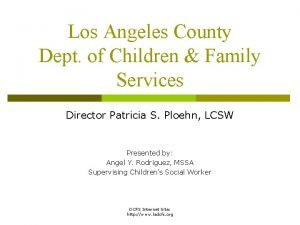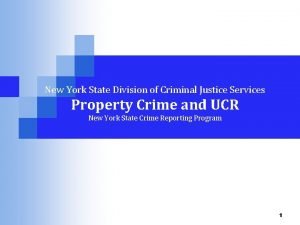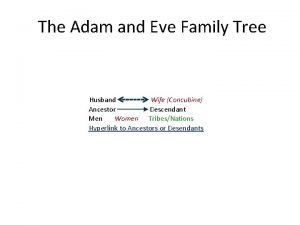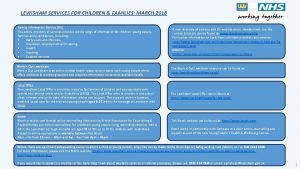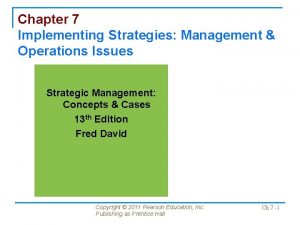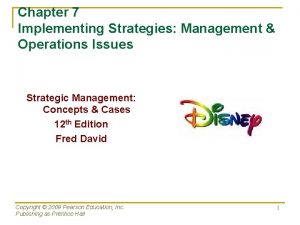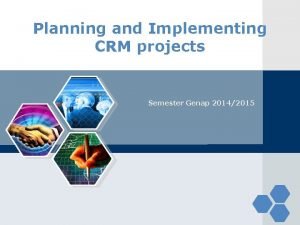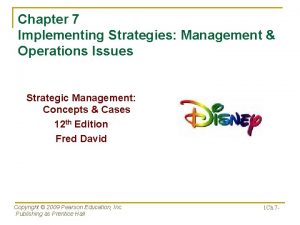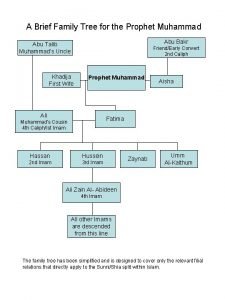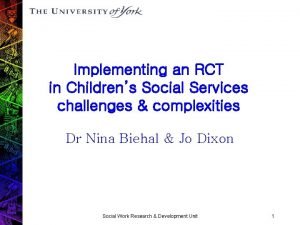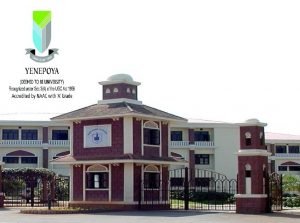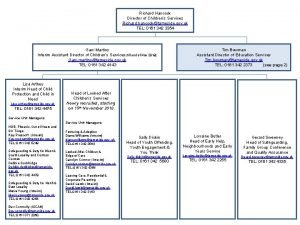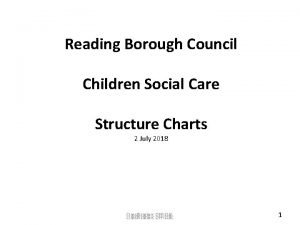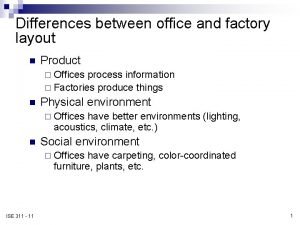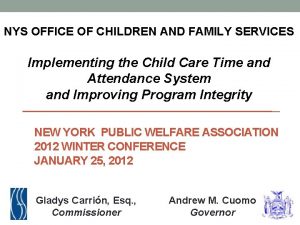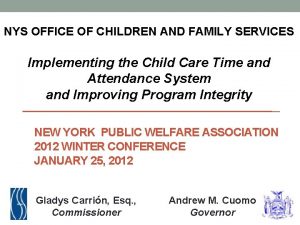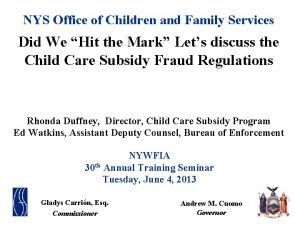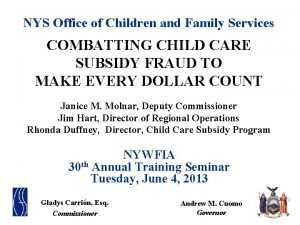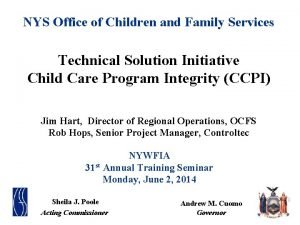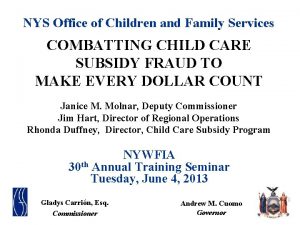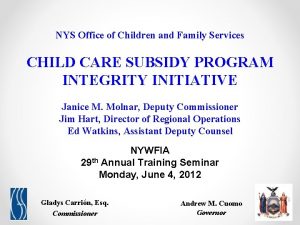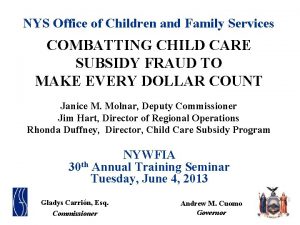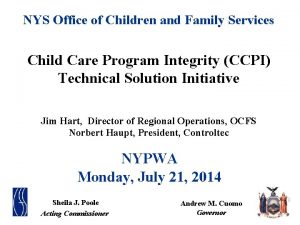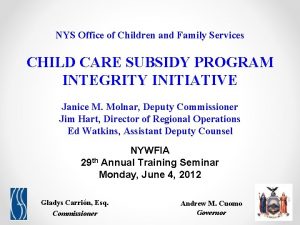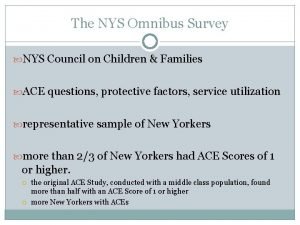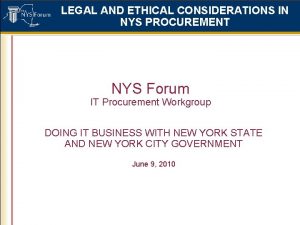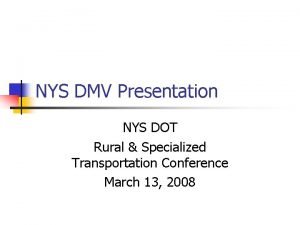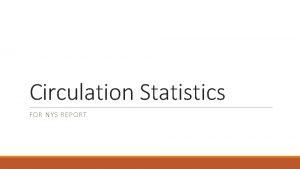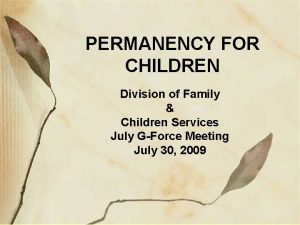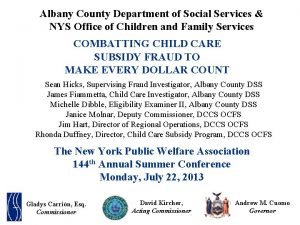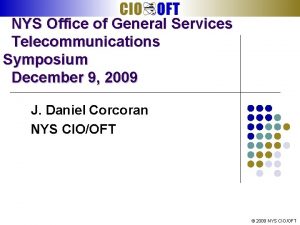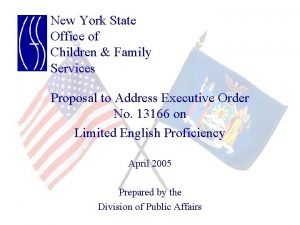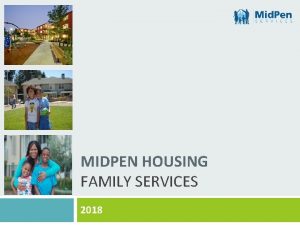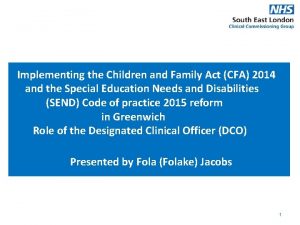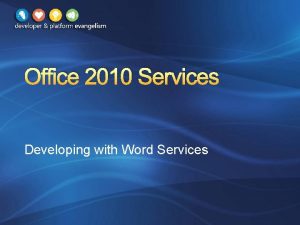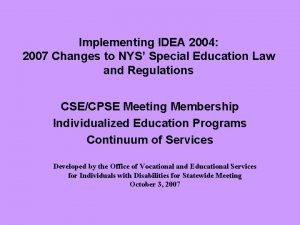NYS OFFICE OF CHILDREN AND FAMILY SERVICES Implementing



























- Slides: 27

NYS OFFICE OF CHILDREN AND FAMILY SERVICES Implementing the Child Care Time and Attendance System and Improving Program Integrity NEW YORK PUBLIC WELFARE ASSOCIATION 2012 WINTER CONFERENCE JANUARY 25, 2012 Gladys Carrión, Esq. , Commissioner Andrew M. Cuomo Governor

2 Presentation Overview q Introductions/Background q Status Update on CCTA today q Year 2 Enhancements q Local District Feedback q OCFS Program Integrity Initiative q Q and A

3 Background q In 2008, OCFS listening tour with child care providers who recommended: q Automating the child care time and attendance and payment calculations processes q In February 2009, the president signed the American Recovery and Reinvestment Act: q OCFS received $96 M over 2 years for child care ($84 M to subsidies; $12 M for quality activities) q Good News: OCFS set aside $5. 3 M to design and deploy CCTA q Not So Good News: Strict deadlines for spending ARRA funds (spend the funds by September 30, 2011)

4 Background Continued… OCFS’ Action Plan: q Released an RFI in June 2009 q Released an RFP in January 2010 q Goals: q Deploy CCTA in all of the districts outside the City of NY q Include 25% or more of the children in each district q Awarded the contract in May 2010 to Controltec, Inc. : q Subcontracted with SUNY PDP to train district staff and to develop training materials for providers and parents q Subcontracts with IBM to host the application q Staffs a Support Center in Onondaga County

5 Background Continued…. q In 2010 (time and attendance in 57 upstate districts): q 33 districts on a manual process q 19 districts using KT 3 q 4 using a different automated process q 1 using IVR (telephony) q Decision Point on CCTA Design: 3 Types q Parent-driven: child time in/time out; submits electronically q Provider records attendance; submits electronically q Manual Process

6 Pilot & Deployment q Pilot: Niagara (KT) and Albany (Manual): Jan ‘ 11 q Deployment: 55 districts were deployed between February ’ 11 – August ’ 11 q Timeline: q February 2011 – 4 counties q March 2011 – 10 counties q April 2011 - 16 counties q May 2011 – 13 counties q June 2011 – 8 counties q July 2011 – 3 counties q August 2011 – 1 county (*see actual schedules by district in your packets)

7 Deployment Challenges q Inflexible schedule – Must be completed by Sept 30, 2011 q Most challenging winter in recent years (Dec ‘ 10 -March ‘ 11) q Unexpected technical difficulties q Dropped sessions q System slowness

8 District Feedback q Duplicate entry q WMS Data Import, 1 Business Day q County Access to CCTA Data q BICS Export q Overrides

9 Status Update on CCTA We have come along way baby, in such a short time! q As of December 31, 2011 CCTA is: q Deployed to 57 districts q Producing $17. 3 M a month in payments ($206 M annually) q Calculating payments for almost 20, 000 families/33, 000 children q Paying almost 8, 000 child care providers q 38 districts are using CCTA for over 75% of their children

10 Status Update on CCTA We have come along way baby, in such a short time! Where are we with CCTA today?

11 Status Update on CCTA We have come along way baby, in such a short time! Where are we with CCTA today?

12 Status Update on CCTA We have come along way baby, in such a short time! Where are we with CCTA today?

13 Status Update on CCTA We have come along way baby, in such a short time! Where are we with CCTA today?

14 CCTA Design q Key parameter - Parent driven q CCTA is designed to support: q Parent time-in/time-out q Provider Web Submittal q Automated payment calculation q Export to BICS

15 State/Local Partnership q Established CCTA Enhancement User Group q Counties invited to participate on recent conf call q Meeting schedule sent to these counties q Established Fraud User Group q CCTA has several built in fraud indicators, i. e. 100% attendance q Inviting LDSSs who may wish participate q Partner with the Support Center

16 CCTA Accomplishments q CCTA environment runs 24 x 7. In 2011, this environment was operational 100% of the time. q To deploy CCTA within the ARRA timeframes required: close collaboration of 1600 staff from 64 public/private organizations, including 3 state agencies, 57 counties and 4 private companies (Controltec, IBM, PDP, QTS). q CCTA was awarded Best of New York by the Center for Digital Government.

17 What We all Have Been Waiting For… ! Year 2 Improvements and Enhancements: Key areas being addressed: q Review notices, timesheets, & other correspondence to families & providers for consistency. q Review the payment process and the screens supporting that process (payment page, payment processing page, queues) q Utilize the Provider Web Submittal site for electronic notification of information from LDSSs to providers i. e. , fee amounts, fee changes, recert dates, new authorizations and payment information

18 Where is CCTA today? District Feedback: Broome County q Initial goal - 50% of children billed thru web attendance q Currently, 70% of children billed online with 35% of providers using CCTA q How did Broome County promote CCTA? q Provider letter explaining benefits of using electronic billing q Targeted Day Care Centers (individual phone calls) q Incentives for electronic billing (3 day turnaround) q Disincentives for paper billing (12 – 13 day turnaround)

19 Broome County Continued… q Advantages for Districts of Electronic Submittal: q Easier approval process q Verification of schedules q Faster resolution of problems q Real time access to data q Elimination of manual process q Reduction of staff time q Improved relationship with providers

20 Provider Engagement is Critical District feedback: “It is a significant time savings when the provider uses web submittal” q Provider Recruitment Packet q. Benefits to Providers for Using CCTA q. Simplify billing q. Improve timeliness and accuracy of payments q. Relieve administrative overhead q. Resources for Recruiting Providers to use CCTA: q Local CCRRs q CSEA (union representing home-based providers in upstate NY) q CCTA team and CCTA Support Center q State/local workgroups (CCTA User and Fraud User Workgroups)

21 NYS Identifies Red Flags to Detect Fraud The new, automated Child Care Time and Attendance System (CCTA) includes the following Red Flags: • Parents/caretakers use a password to check the child in and out of • • the system automatically; Biometric devices to be piloted Attendance data is captured in the system in real time; inspectors check CCTA for attendance prior to an inspection. If a change is made, the system records all transactions in history establishing an audit trail. The system captures “exceptions” which the district can review when a child has perfect attendance and when a provider changes the check in and out times recorded by the parent. CCTA interfaces with NY’s regulatory database to confirm that the provider is licensed/registered and is in a payable status both at time of authorization and when making the payment.

22 Steps NYS Has Taken to Prevent Waste, Fraud and Abuse q Conducted a Roundtable Discussion in October 2010 for 100 participants (invitation only) q. Recommendations from this roundtable set the stage for our Child Care Subsidy Program Integrity Initiative. q Built a partnership with New York Welfare Fraud Investigators Association (NYWFIA) q. Increased coordination between the child care regulated care staff and the child care subsidy program staff

23 Multi-Pronged Approach to Improving Program Integrity 1. New Child Care Subsidy Fraud Regulations effective October 5, 2011: Provides LDSS’ more authority to stop child care payments 2. Additional Resources available for LDSSs to Address Fraud: OCFS announced opportunities for mini-grants to districts in January 2012 3. New Pilot to enhance CCTA using Biometric Devices: OCFS to work with a few counties this year to test biometric devices 4. Technical Solution to Assist the State and Localities with detecting fraudsters: OCFS to release an RFP this year

24 Program Integrity-Technical Solution q Current challenge: various disparate data sources that exist; lack of data integration between systems/data in “silos” q September 2011, OCFS released a Request For Information(RFI) -I 8 vendors responded to the RFI q October 2011, 14 vendor presentations were conducted. q Lessons learned: Spectrum of services should include, but are not limited to: q q q q Data integration Rules management Anomaly detection Predictive modeling Social networking analysis Forensic review Fraud case management

25 Program Integrity-Technical Solution Next steps: q OCFS to release a Request for Proposal (RFP) q We envision a tool that will analyze and integrate our data from the various data systems in New York State q Data would be run against various predictors/red flags identified as highly indicative of fraudulent activity q Investigations would be focused on cases that have a higher propensity of fraudulent activity, allowing for more efficient and effective investigations and better utilization of resources

26 In Summary 1. Implementing CCTA (HAPPY 1 -YEAR ANNIVERSARY!!): • Where we’ve been • Where we are today • Where we are going • Action Plan for Year 2 Enhancements • Join the Fun - Become a Charter Member of Our Newly Formed User Groups (CCTA Enhancements User Group and Child Care Subsidy Fraud User Group) • Strategies to Engage Child Care Providers to Use CCTA as Intended 2. Improving Program Integrity in Child Care • Red Flags built into CCTA • Lessons Learned from our Roundtable Discussion in Oct 2010 • OCFS’ Multi-Pronged Approach: Improving Program Integrity

27 Questions and Answers http: //www. ocfs. state. ny. us/main/childcare
 Child welfare services
Child welfare services Nys medicaid inspector general
Nys medicaid inspector general Department of criminal justice services ny
Department of criminal justice services ny Adam eve lineage
Adam eve lineage Downderry children's and family centre
Downderry children's and family centre Implementing strategies management and operations issues
Implementing strategies management and operations issues Implement strategies management issues
Implement strategies management issues Implementing strategies: management and operations issues
Implementing strategies: management and operations issues Tripod pricing strategy
Tripod pricing strategy Designing and implementing brand architecture strategies
Designing and implementing brand architecture strategies Brand hierarchy levels
Brand hierarchy levels Crm project design and planning process
Crm project design and planning process Strategic business unit structure
Strategic business unit structure Designing and implementing brand architecture strategies
Designing and implementing brand architecture strategies Ch 7
Ch 7 Prophet family tree
Prophet family tree Rct children's services
Rct children's services Hampshire early years advisory team
Hampshire early years advisory team Agency related to child welfare
Agency related to child welfare Agencies related to welfare services to the child
Agencies related to welfare services to the child Lisa arthey
Lisa arthey Lorain county child services
Lorain county child services Reading borough council children's social services
Reading borough council children's social services Factory office plan
Factory office plan Nys ogs design and construction
Nys ogs design and construction Nys relationships and biodiversity lab answer key
Nys relationships and biodiversity lab answer key Nys department of agriculture and markets license
Nys department of agriculture and markets license Office of aging
Office of aging
